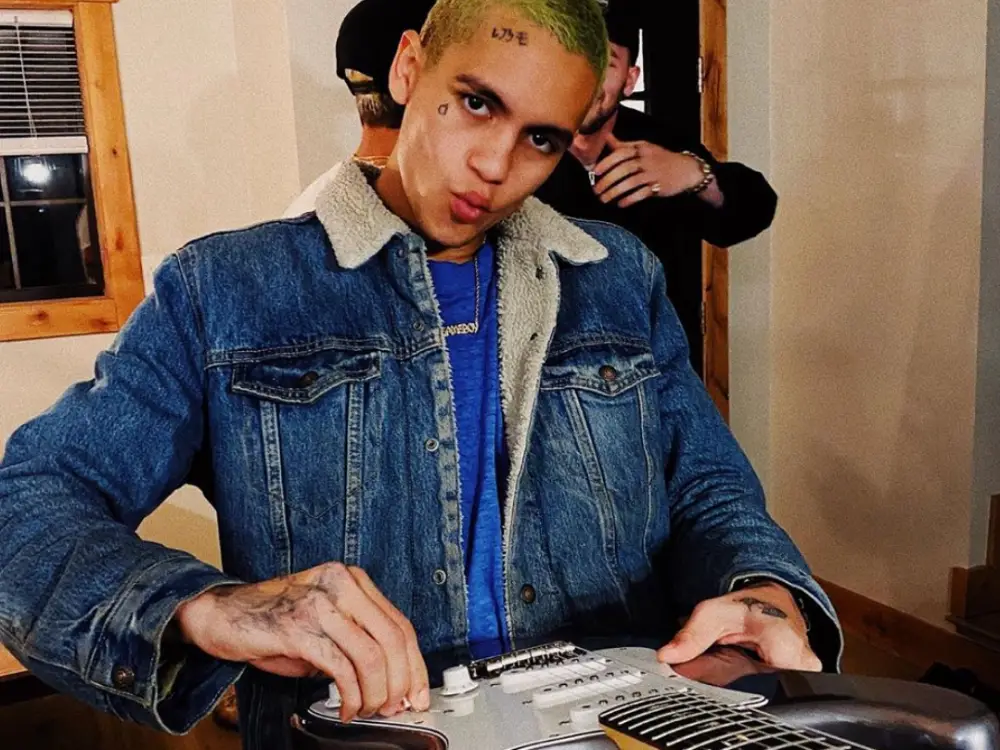Dominic Fike rose to fame after signing with Columbia Records without any previously released music, leading to the false accusations of being an industry plant.
Nowadays, there are so many things that go into crafting and launching an artist into fame. It’s now easier but simultaneously harder to make it in music. Self-publication sites and accessibility to music production software have removed a lot of the barriers that previously made it tough for artists to enter the industry.
However, while this has made it easier to become an artist, it has made it more difficult for artists to obtain mainstream attention because of how oversaturated the market has become. Genuine talent can go undiscovered while those with arguably less talent and a flashier personality may see greater success.
Sometimes artists can seem to rise to fame overnight. Remember how we all went from hearing Lil Nas X’s “Old Town Road” for the first time and then progressed to hearing it on the radio multiple times a day a week later? That kind of overnight. Occurrences like this are the reason why some music fans have started to believe that some artists are developed and backed by labels who then help them rapidly propel to fame.
The term also applies to musicians who hold industry ties that could get into contact with the right people. These kinds of artists are called industry plants. Many of the artists who have had this term sprung onto them include Lil Nas X, Juice WRLD, Billie Eilish, Clairo and Cardi B to name a few, but you can imagine anyone who has experienced rapid fame has been labeled this at some point.
But perhaps one artist with the most convincing evidence of their status as an industry plant is Dominic Fike, who you might know from his track “3 Nights.” At 22 years old he sparked a multimillion-dollar bidding war before ultimately signing to Columbia Records back in 2018 at a time when finding his music online was impossible.
His highly anticipated debut EP, “Don’t Forget About Me, Demos” was all he needed to get major attention. After writing the project while on house arrest, Fike self-released part of the EP in 2017 while he was in jail; he then pulled the release. By the time news broke about his rumored $4 million deal with Columbia in 2018, all of his old music had been removed and there was nothing to attest to his talent on the internet.
The Naples, Florida native had a prior history of making SoundCloud rap, but his new style promised very guitar heavy chill rock sounds — a complete pivot from the kind of music he once made.
Bidding wars between labels are common. But they usually break out over artists who have recently had a viral hit whose new fame and profitability makes them attractive investments. With virtually no music available online, the lack of a fan base and an anticipation of an EP that was a complete 180 from his other music, the reason for label interest in Fike was confusing. Thus, he was labeled an industry plant.
Fike’s manager attributes the unlikely interest in the rapper to the unreleased music they leveraged to labels. He denies the industry plant title placed on Fike and tells The Fader, “I smile at it every time.”
The term industry plant comes with some connotations. Some people don’t care, but to others it’s not a positive thing. Those who use it often devalue the music of that artist simply because of the possibility they may have had an unfair advantage in launching their career. However, one thing to consider: Is an industry plant even a real thing?
Most industry plants receive the title because they experience an inexplicable amount of growth in a short amount of time. Some of these artists may have also had little to no other music available prior to their newfound stardom, making their rise even more mysterious. This is the origin of the conspiracy that labels are developing and hiding talent and then just suddenly making them famous.
Though this theory is not entirely wrong, it is a weak one. Yes, labels do work with their artists over time to develop their talent, sound and persona, but the idea that they have the ability to just choose a time to make them successful is unlikely. If labels could just choose when they wanted to make an artist famous, they would do it all the time with every artist.
There are also people who use the title to refer to artists who have industry connections. This implies that someone with an in might have pulled some strings to get them noticed by a label. Since becoming successful in music has now become so easy and so do-it-yourself, younger generations of listeners have grown to have a soft spot for these kinds of artists.
However, it is important to remember that prior to 10 to 15 years ago, the only way to get discovered was by knowing someone. By today’s definitions, the majority of the artists on the Billboard Hot 100 in 2000 would have been categorized as industry plants.
Therefore, due to the prominence of self-made artists and how favorably they are viewed, if you’re an artist with industry ties or label support you are an industry plant. But it’s important to remember that not very long ago doing the things so-called industry plants are accused of doing today was pretty much the only way to make it in music.
There are logical explanations why some artists rise to fame rather quickly. Sometimes the answer is that they just get lucky. Sometimes the YouTube algorithm works out in their favor, it blows up on TikTok, Spotify places it on a playlist or Kylie Jenner plays your song in the background of a Snapchat video.
Industry plant or not, the title ultimately hurts artists. It can devalue years of hard work put into their craft. Some listeners might know the artist as an industry plant before they even know them as an artist, and those with negative opinions of industry plants might pass on listening to their music in the first place.
In the case of Fike, that would be a grave mistake. His eight track, 17 minute long “Don’t Forget About Me, Demos” 2018 EP leaves you wanting to hear more. It gives us a great taste of his range, uniqueness and talent. The EP boasts tracks like “3 Nights,” an upbeat melody with a clap sounding guitar pattern, and “Westcoast Collective.” It’s the rap-rock love child that would intrigue any alternative fan.
Largely, the meaning of the term industry plant varies from user to user, but so does its association. It’s a polarizing topic that many see it as something that reflects negatively on the artist while others simply don’t care. Many also find that the distaste of the idea of an industry plant is a poor one because it just criticizes those who use traditional channels of acquiring fame in an age where the internet hosts itself as goldmine for self-made talent.
While the jury is still out on whether industry plants are good or bad or if they even exist, it doesn’t matter. We shouldn’t need anyone’s confirmation to understand what good music is. And Fike embodies that. He’s not an industry plant, but even if he was it’s foolish to disregard any hard work put into music because of how the artist might have found fame.
https://www.instagram.com/p/B2lDtMBF4UC/?utm_source=ig_web_copy_link
Sure, their growth may not have been the most authentic, but these artists are still incredibly talented, and listeners would be doing themselves a disservice if they overlooked that simply because of a title that is haphazardly thrown onto artists. Judging what could potentially be good music based on what you’ve heard about the artist can close you off from ever discovering your new favorite songs.

















